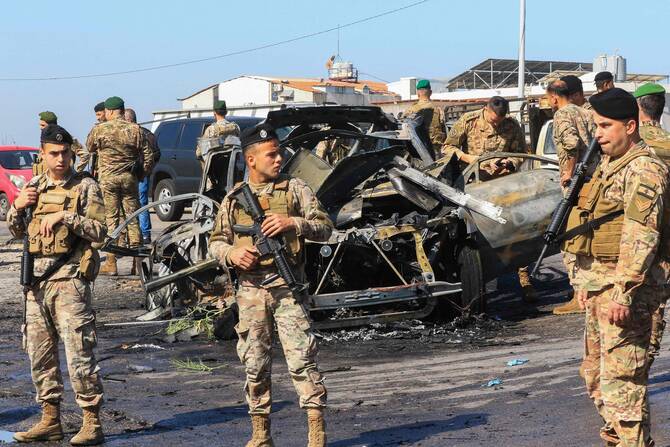
- ARAB NEWS
- 01 Aug 2025

For years I have been arguing that Lebanon has been at war since 1975, and maybe before then. The hyped idea that peace has prevailed since 1990 is a myth: the Taif agreement led to a long ceasefire and paved the way for a coexistence formula that at times has proved short of accommodating the many national, regional, and international divides.
Unlike what many Lebanese people tell you, the war is mainly Lebanon vs. Lebanon: a country that is not at peace with itself, with its national identity, with its minorities’ many identities, religious and sectarian, even communitarian and ethnic. All that before even addressing Lebanon’s relationships with long-term Palestinian and more recent Syrian refugees within its borders, or its relationship with its immediate neighbors Syria and Israel, or with the wider Arab world, or with countries such as France and Britian that for centuries were involved in protecting some of its minorities.
More than a century since the establishment of greater Lebanon and nearly 80 years since its independence, Lebanon is again at a crossroads — with an opportunity to find its feet, and for the new government to usher in a new era of healing and push toward a balanced and stable future. Last weekend’s commemoration of the start of the civil war 50 years ago should be the catalyst to realize that Lebanon is finally free of Assad regime diktats, and that its government is free of the pro-Iran Hezbollah militia, weakened and nearly eclipsed after the war with Israel.
The government marked last Sunday’s anniversary with a small ceremony and a minute’s silence. It was a rare official acknowledgement of the legacy of Lebanon’s civil war. Citizens remembered the strife that killed more than 150,000 people and left 17,000 missing, with trench warfare in towns and cities, massacres, snipers, assassinations and car bombs.
There have been many efforts to define the root causes of the civil war and why Lebanese failed to avert it, but consensus remain elusive. Some reduce the problem to a Christian-Muslim divide over the need to defend Palestine at the expense of Lebanese sovereignty. Others blame the Cairo Arab summit in 1969, permitting the Palestinians to arm and resist Israel from inside Lebanon.
Many even believe that the war began in 1973, when the Lebanese armed forces backed down from taking control of Palestinian refugees camps. Some argue that was the brief civil strife of 1958, when Lebanon was split along pro-Nasser and anti-Nasser lines, and people skirmished in street battles while the army tried to hold the peace.
For years I have been arguing that Lebanon has been at war since 1975, and maybe before then. The hyped idea that peace has prevailed since 1990 is a myth.
Mohamed Chebaro
After April 13, 1975, the war unfolded and alliances shifted, with new factions formed. Israel and Syria occupied parts of the country. The US intervened, and the US Embassy and Marine barracks were bombed. Beirut was divided between Christian and Muslim sectors. Later Syria dominated the country only to cede its control to Hezbollah. That was followed by waves of assassinations of politicians, journalists and activists.
Fast forward to today, and Lebanon is still grappling with that legacy, as every community has a different set of memories. But while people may disagree about history, they all ought to focus on the current opportunity and try to determine the country’s future.
The election of a president and appointment of a prime minister free of Syrian or Iranian influence should be grasped, despite unfair accusations of undue French and American influence. The new government needs to be judged on how it tackles urgent and sensitive issues. Among those is the course of Lebanese-Syrian ties since the overthrow of the Assad regime, which exercised decades-long hegemony over Lebanon and is accused of assassinating numerous Lebanese officials who opposed Syrian rule.
A new draft banking law seem a step in the right direction to unlock international aid to emerge from an economic crisis it has suffered since 2019. New banking laws could return lost trust, refloat the economy, and release all or part of depositors’ savings that the previous government used to prop up ruling elites and their cronies.
Finally, one must not belittle the news that most Hezbollah military sites in south Lebanon have ceded to the army. The Nov. 27 ceasefire that ended more than a year of conflict between Hezbollah and Israel, including two months of full-blown war, required that only UN peacekeepers and Lebanon’s army should be deployed south of the Litani River, about 30 kilometers from the Israeli border.
All this looks like a promising departure from Lebanon’s recent history, critical and timely steps in the right direction. Policy making in Lebanon has always been challenging as the limited resources of a small nation have often left out a player, as in musical chairs, when the music stops. In his speech marking the anniversary of the outbreak of the civil war, President Joseph Aoun renewed his appeal for Hezbollah to lay down its weapons. Heeding the president’s call will be crucial if Lebanese people hope to abandon the state of perpetual war and embrace a peaceful future.